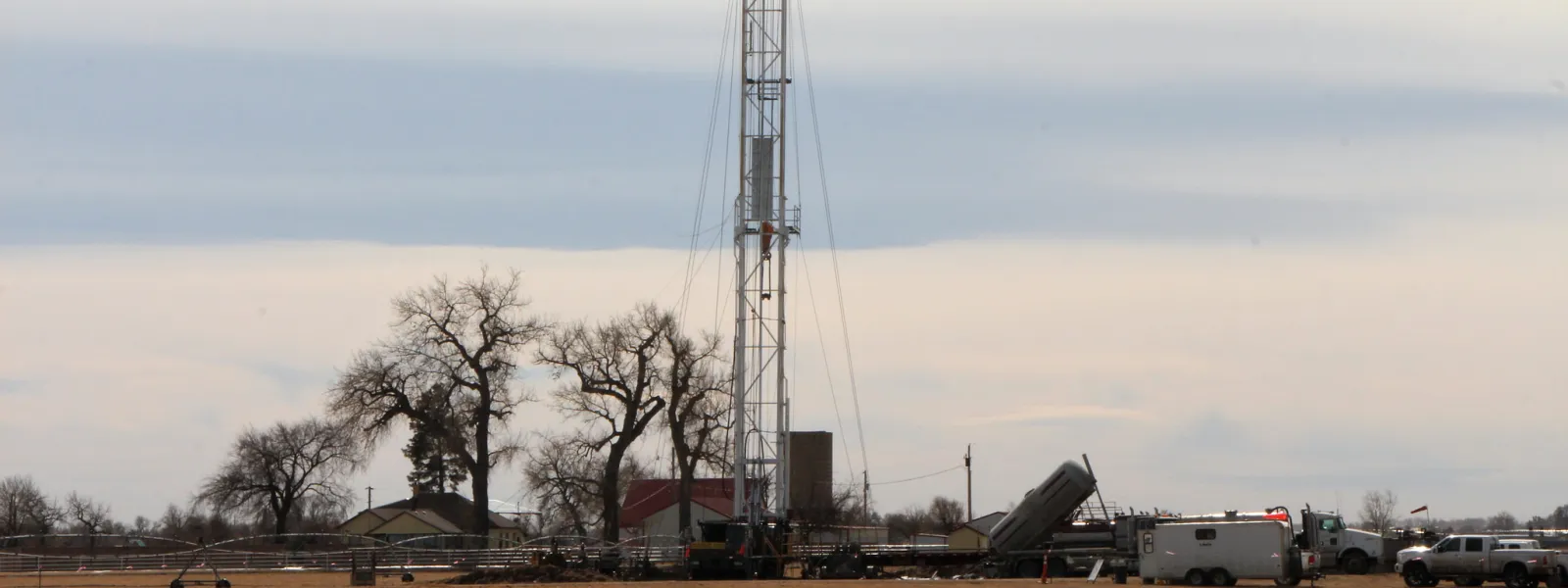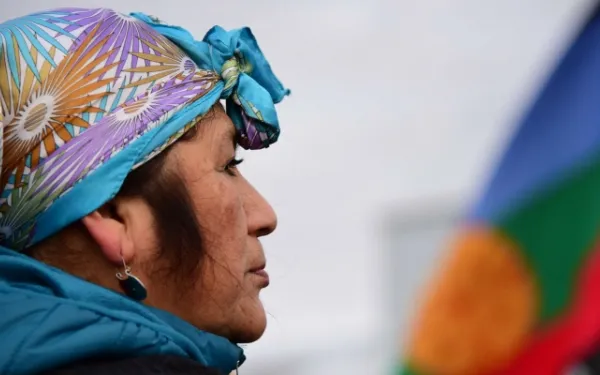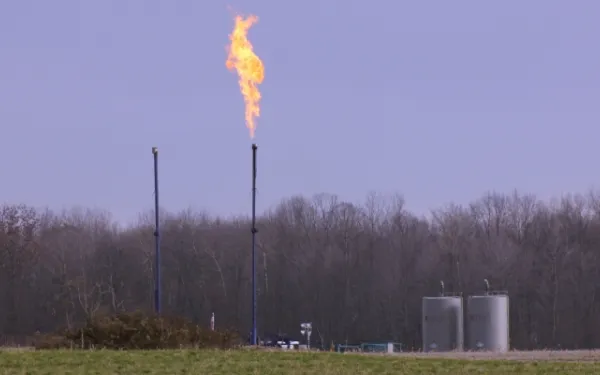
Project
Foto: Andrés ÁngelStopping the spread of fracking in Latin America
“Fracking” is short for hydraulic fracturing, a process used to extract oil and natural gas from historically inaccessible reservoirs.
Fracking is already widespread in the global North, but in Latin America, it is just beginning. Governments are opening their doors to fracking without understanding its impacts and risks, and without consulting affected communities. Many communities are organizing to prevent or stop the impacts of fracking, which affect their fundamental human rights. But in many cases they require legal and technical support.
What exactly is fracking, and what are its impacts?
A straight hole is drilled deep into the earth. Then the drill curves and bores horizontally, making an L-shaped hole. Fracking fluid—a mixture of water, chemicals, and sand—is pumped into the hole at high pressure, fracturing layers of shale rock above and below the hole. Gas or oil trapped in the rock rises to the surface along with the fracking fluid.
The chemical soup—now also contaminated with heavy metals and even radioactive elements from underground—is frequently dumped into unlined ponds. It may seep into aquifers and overflow into streams, poisoning water sources for people, agriculture, and livestock. Gas may also seep from fractured rock or from the well into aquifers; as a result, water flowing from household taps can be lit on fire. Other documented harms include exhausted freshwater supplies (for all that fracking fluid), air pollution from drill and pump rigs, large methane emissions that aggravate global warming, earthquakes, and health harms including cancer and birth defects.
AIDA’s report on fracking (available in Spanish) analyzes the viability of applying the precautionary principle as an institutional tool to prevent, avoid or stop hydraulic fracturing operations in Latin America.
Partners:

Related projects
Latest News

Argentina’s approval of fracking wells violates international obligations
The authorization of four fracking wells within the Vaca Muerta shale deposit poses a risk to vital water sources and violates the rights of Mapuche communities. In support of an amparo filed to invalidate the project’s approval, AIDA presented evidence detailing Argentina’s failure to comply with international environmental and human rights obligations. Mendoza, Argentina. Argentina violated international environmental and human rights obligations when it authorized the development of four fracking wells in indigenous territory. The wells would damage vital water sources and violate the rights of Mapuche communities, AIDA explained in an amicus brief presented before the Supreme Court of Mendoza Province. The brief supports an amparo seeking to invalidate the project’s approval, filed by the Environment and Natural Resources Foundation (FARN, for its initials in Spanish). “Fracking was authorized in Mendoza without any environmental impact assessment,” explained AIDA Attorney Claudia Velarde. “In fact, the project was presented for authorization as ‘infrastructure adaptation’ and the environmental authority granted the permits in a record time of just six days.” The wells are located within Vaca Muerta, the largest non-conventional deposit of shale gas in Latin America. Mapuche indigenous communities—recognized by the National Institute of Indigenous Affairs—live in the project area and, as such, have the right to prior consultation; operators must receive their free, prior and informed consent for any activity affecting their territory. The energy company El Trebol S.A. failed to recognize that right when assessing the project. As a result, the project’s authorization violates Convention 169 of the International Labor Organization, the United Nations Declaration on the Rights of Indigenous Peoples, and the American Declaration on the Rights of Indigenous People—all international standards recognized by Argentina. “The chemicals used in fracking can contaminate both surface and groundwater, including, in this case, those of the Llancanelo lagoon, a wetland of international importance under the Ramsar Convention, a treaty ratified by the government of Argentina,” said Velarde. “The site is a zone of passage and rest for more than 130 species of resident and migratory birds.” In addition, fracking activities require large amounts of water, while Mendoza has for years suffered from drought, a problem only aggravated by climate change. Finally, the brief emphasizes that there is neither detailed geological data of the zone nor quality information on the dynamics of the groundwater. “Faced with this scientific uncertainty, authorities have an obligation to apply the precautionary principle,” Velarde explained. “An activity as potentially harmful as fracking must be rejected unless those seeking to implement it can prove that it will not cause serious and irreversible damage to the environment.” Press contact: Victor Quintanilla (Mexico), AIDA, [email protected], +5215570522107
Read more
Defending communities from fracking’s advance in Argentina
In a country highly dependent on hydrocarbons, human rights and those of nature are often overlooked. That's why in Argentina, AIDA and our allies are supporting the efforts of communities and organizations to avoid the damages caused by fracking.In Neuquén province in Argentine Patagonia, a large metal structure rises high above the apple trees. It’s one of many fracking wells that have been installed in this rich natural area. A single well like this one requires roughly 11 million liters of water for operation, the equivalent to 18 years of water consumption for an average family. Despite being internationally recognized as an experimental, risky and contaminating process, fracking is spreading rapidly through Argentina, affecting the land and water of the Mapuche people and other local communities. Much of the nation’s exploration is taking place at Vaca Muerta, the largest unconventional gas reserve in Latin America. Roughly 30 thousand square kilometers, the site covers four Argentine provinces: Neuquén, Rio Negro, La Pampa and Mendoza. The expansion of fracking has brought with it problems like pollution and great harm to the livelihoods of local communities, including the Mapuche, who are forced to find new ways of living on their land in order to avoid migration to urban centers. Oil companies generate unstable and short-term employment. And, due to the increase in the price of land, the residents of the area must earn more money to maintain their standard of living. In a country that gets 90 percent of its energy from hydrocarbons, the government has failed to prioritize the rights of indigenous peoples, of children and of nature. Instead, it has favored the economic income of a highly unsustainable activity. That’s why the efforts of communities and civil society organizations to resist the blind advance of fracking are fundamental. “What motivates me is caring for our land and water; nature is not ours, we belong to it,” stated Santiago Cane, member of the Environment and Natural Resources Foundation (FARN), an organization that is using the courts to stop fracking. FARN filed a writ of amparo to invalidate the authorizations granted for the exploitation of four fracking wells in Mendoza. The environmental authority granted the permits in July 2017, in a record time of six days, without requiring an Environmental Impact Assessment. The lawsuit, which AIDA is supporting from our experience in international environmental law, remains in process. “In Mendoza, fracking is advancing at a rapid pace,” Santiago explained. “The national and provincial governments are not taking into account the potentially irreversible pollution of water sources that serve several cities.” In fact, Mendoza is a province that has suffered from water scarcity for years, a problem aggravated by climate change. Those who promote fracking in Mendoza also overlook the fact that, by contaminating both surface and ground water supplies, the toxic chemicals used in fracking will likely reach the Llancanelo lagoon, a wetland of international importance located in the foothills of the Andes Mountains. The lagoon is a mandatory passage and rest area for more than 130 species of resident and migratory birds. Additionally, the region is home to the Mapuche people. According to international law, indigenous peoples like the Mapuche must give their free, prior and informed consent to any activity that affects their territory. That right is not being respected in this case. “I am motivated by the idea of a different economy that does not deprecate nature and that does not generate the accumulation of wealth within small groups of society,” Santiago adds. FARN, together with AIDA, is part of the Latin American Alliance on Fracking, a coalition of organizations that work to slow fracking’s advance in the region. Together we will continue our work to avoid fracking’s damages to our land and water. We are convinced that the power to stop fracking lies with the people.
Read more
How to fight fracking with the law
Fracking is spreading rapidly through Latin America. If left to develop blindly, it could cause irreparable harm not just to the environment but also to public health. Claudia Velarde, a Bolivian environmental attorney, believes humanity and Mother Earth should not be seen as different or isolated beings. “The activities that affect the conservation of nature will have repercussions in our lives as well,” she said. This conviction led her to join AIDA’s team of attorneys earlier in 2017, to be part of our efforts to protect the environment from extractive activities like fracking and large-scale mining. For our Freshwater Protection Program, Claudia helps coordinate the work of the Latin American Alliance on Fracking, a coalition that promotes public debate, awareness, and education among civil society groups. The Alliance also supports resistance efforts by communities throughout the region. Confirmed risks The extraction of gas and oil through fracking, or hydraulic fracturing, could have a “nefarious effect” on the quality and availability of potable water. This was the conclusion of the most exhaustive study yet completed by the Environmental Protection Agency of the United States, the nation that pioneered this controversial technique. Oil and gas companies inject fracking wells with large amounts of water mixed with highly concentrated chemicals. The toxic solution fractures rocks to release trapped oil and/or gas. According to the study, the poisonous fluids leach through soil and contaminate groundwater. By contaminating water sources, fracking also affects the lives of the people, animals, plants, and entire ecosystems that depend on them. Ignoring the danger “Dependence on fossil fuels is leading us to an unprecedented environmental and climate crisis,” Claudia explained. “Fracking has serious impacts, so it’s important that people have real and complete information on the policies and procedures related to it.” One procedure that should be followed before any fracking operation is authorized is the preparation of an Environmental Impact Assessment. A proper assessment includes evaluation of possible environmental damages and identification of measures to mitigate the harms. In Latin America, corporations—rather than the governments that regulate them—prepare Environmental Impact Assessments. But often, governments of the region allow companies to skirt this procedure. In Argentina, the environmental authority granted a permit for Petrolera El Trebol to explore and exploit four oil wells conventionally (without using fracking) near Llancanelo Lagoon, a wetland of international importance. Months later, the company decided to frack the wells. Through an abbreviated process, the government authorized the change without requiring a new Environmental Impact Assessment. Faced with this dangerous reality, Argentina’s Foundation for the Environment and Natural Resources (FARN) filed a civil suit, requesting an injunction until the government’s prior authorization is invalidated. The suit argues that, in addition to violating the obligation to require a new Environmental Impact Assessment, the government also failed to respect the affected communities’ right to give their free, prior and informed consent to the project. “We’re appealing to justice to put a stop to this outrage, so the people have an opportunity to discuss, with adequate information, whether or not they approve of these types of activities that cause irremediable environmental damage,” explained Santiago Cané of FARN. “If they do accept fracking, it must be done with the utmost care, using the measures and regulations designed to avoid or mitigate damages.” AIDA is supporting FARN’s legal work with arguments based on international law. The most important is the precautionary principle, which holds that where any uncertainty exists about the risk of serious harm to the environment and human health, the most stringent precautions should be applied. “Given that there is no study with enough technical information on the possible damages of fracking, this principle should be applied to avoid the consolidation of impacts in these and other cases,” Claudia explained. Despite scientific evidence demonstrating many harmful consequences of fracking, the use of the technique is expanding throughout Latin America. Faced with this worrying trend, AIDA will continue working with our partners to find legal solutions with widespread impacts throughout the region.
Read more